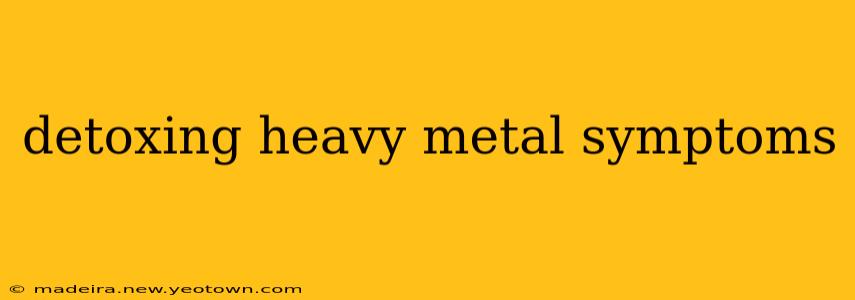Heavy metal toxicity is a serious concern, impacting millions worldwide. While the symptoms can vary wildly depending on the metal involved (lead, mercury, cadmium, arsenic, etc.), the amount of exposure, and individual sensitivity, recognizing them is crucial for early intervention. This isn't medical advice – always consult a doctor for diagnosis and treatment – but this guide will explore the common signs and what you might experience during a detox process. Let's dive in.
Imagine this: You're feeling consistently fatigued, your brain fog is impenetrable, and your joints ache with a persistent dull pain. These are just some of the many subtle ways heavy metals can manifest. The insidious nature of heavy metal poisoning makes detection challenging, often mimicking other conditions. Understanding the potential symptoms is the first step toward addressing the issue.
What are the Common Symptoms of Heavy Metal Toxicity?
Heavy metal toxicity symptoms are multifaceted and can range from mild to severe. They often overlap with other health conditions, making diagnosis crucial. Some common symptoms include:
- Fatigue and Weakness: Feeling persistently tired, even after adequate sleep, is a common early sign.
- Headaches and Migraines: Persistent headaches, especially migraines, can be indicative of heavy metal exposure.
- Cognitive Impairment ("Brain Fog"): Difficulty concentrating, memory problems, and reduced cognitive function are often reported.
- Joint Pain and Muscle Aches: Aches and pains in muscles and joints are common symptoms.
- Gastrointestinal Issues: Nausea, vomiting, diarrhea, and constipation can occur.
- Skin Rashes and Irritation: Skin problems, such as rashes or eczema, may also be related to heavy metal exposure.
- Nervous System Problems: Numbness, tingling, tremors, and difficulty with coordination can be severe symptoms.
- Mood Swings and Depression: Heavy metal toxicity can significantly impact mental health, leading to mood swings and depression.
- Kidney and Liver Damage: In severe cases, heavy metals can damage these vital organs.
What Happens During a Heavy Metal Detox?
The process of detoxing from heavy metals isn't a quick fix; it's a journey that requires patience, persistence, and often, professional guidance. The goal is to support the body's natural elimination processes and minimize the impact of these toxins. Many people experience a range of symptoms during the detox phase, which can include:
- Increased Fatigue: As the body works to remove the toxins, it can initially experience a heightened level of fatigue.
- Headaches and Migraines: As toxins are released, these symptoms can worsen temporarily.
- Flu-like Symptoms: Some individuals experience symptoms similar to the flu, such as body aches, chills, and fever.
- Herxheimer Reaction: This refers to a worsening of symptoms as toxins are released and the body tries to eliminate them. This reaction, while temporary and uncomfortable, is often seen as a sign that the detox is working.
- Emotional Ups and Downs: The detox process can be emotionally challenging as well.
Can Chelation Therapy Help with Heavy Metal Detox?
Chelation therapy is a medical procedure used to remove heavy metals from the body. It involves using a medication that binds to the heavy metals, allowing them to be excreted through the urine. It's important to note that chelation therapy should only be performed under the strict supervision of a qualified healthcare professional. It's not a suitable approach for everyone, and incorrect administration can be harmful.
What are the Natural Ways to Support Heavy Metal Detox?
While chelation is a medical intervention, several natural approaches can support the body's natural detoxification processes. These include:
- Dietary Changes: Focusing on a diet rich in fruits, vegetables, and whole grains can provide essential nutrients and support detoxification.
- Hydration: Drinking plenty of water is crucial for flushing toxins from the body.
- Specific Nutrients: Certain nutrients, like chlorella, cilantro, and zeolite, are often cited for their purported heavy metal-binding properties. Again, consult your doctor before incorporating these into your regime.
- Exercise and Sweat: Sweating can help to eliminate some toxins from the body.
- Sauna Therapy: Infrared saunas can further assist in detoxification.
What are the Long-Term Effects of Heavy Metal Toxicity?
Untreated heavy metal toxicity can lead to significant long-term health consequences, impacting various bodily systems. These can include:
- Neurological Damage: This could manifest as impaired cognitive function, motor skill deficits, and even neurological disorders.
- Kidney and Liver Failure: Prolonged exposure can severely damage these organs.
- Cardiovascular Issues: Heavy metals can contribute to cardiovascular disease.
- Cancer: Certain heavy metals are linked to an increased risk of cancer.
Disclaimer: This information is for educational purposes only and is not a substitute for professional medical advice. Always consult with a qualified healthcare provider before attempting any detox program, especially if you suspect heavy metal toxicity. Self-treating can be dangerous, and proper diagnosis is crucial for effective and safe treatment.

